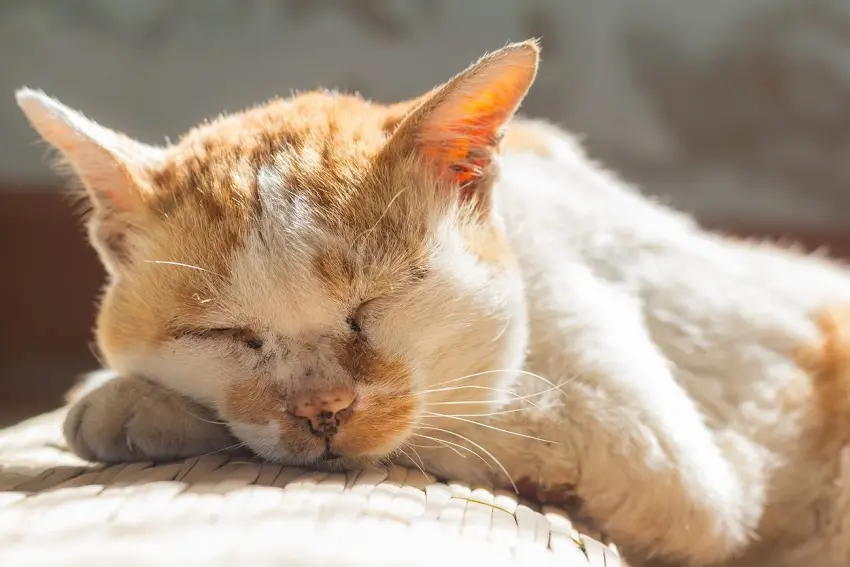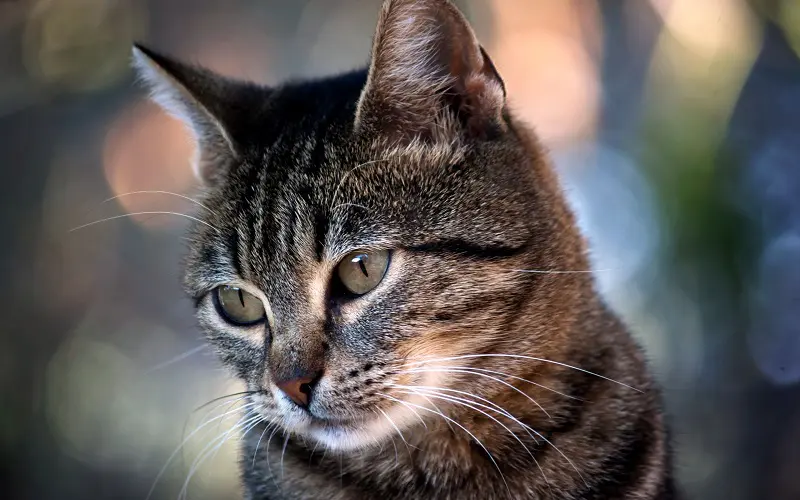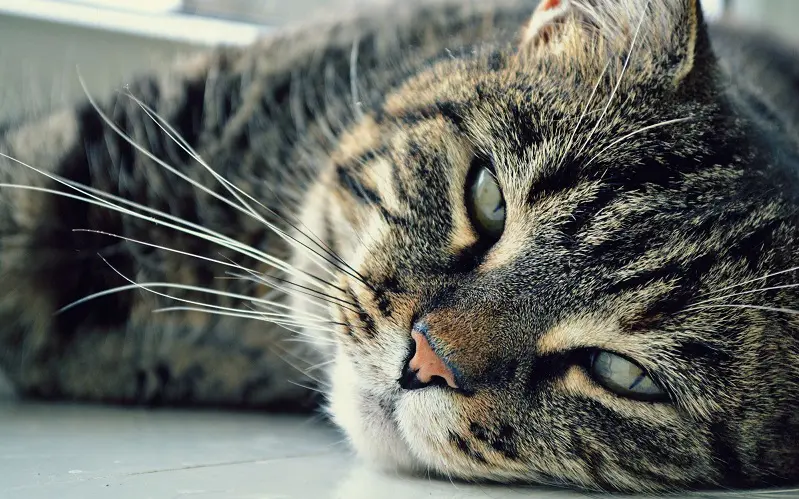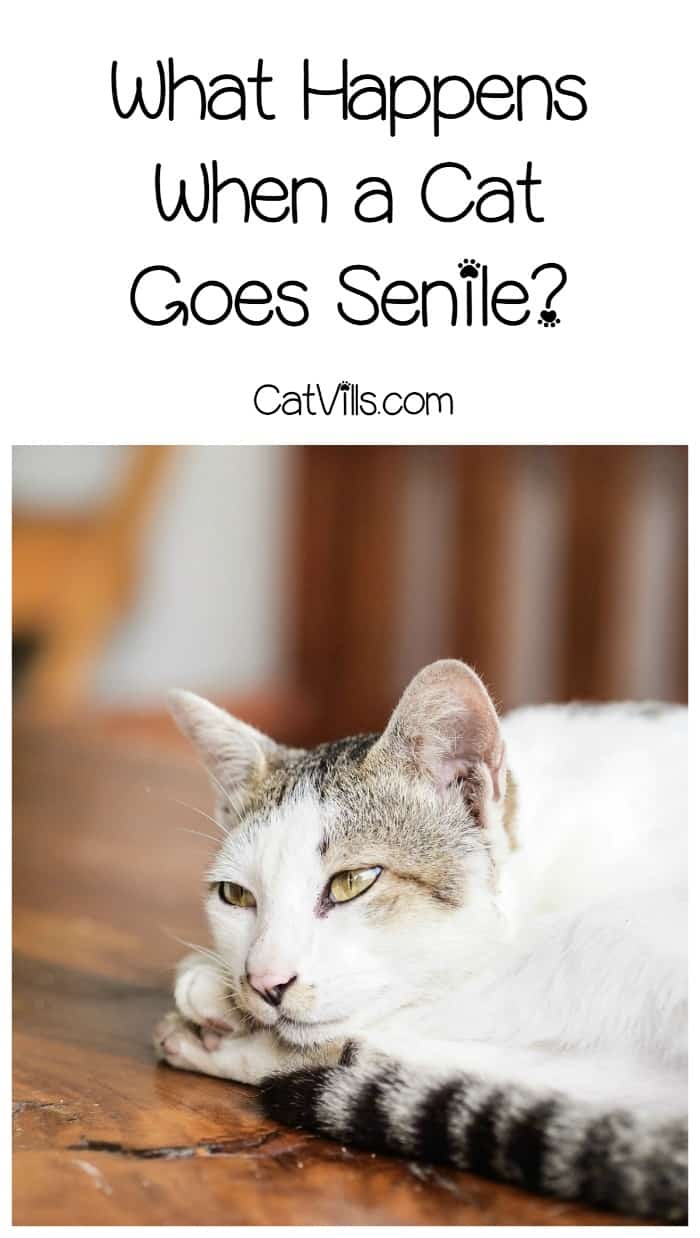Last Updated: 2 months ago
When people think of “dementia,” they often assume that the person suffering from it is a human being.
Perhaps they’ve seen dementia in older relatives. What many people don’t realize is that pets, including cats, can also get dementia as they age.
Much like with human dementia, cat dementia is the deterioration of a cat’s brain as it ages.
It has a lot of symptoms that may worry cat owners, and treatment isn’t exactly doable.
Before you panic, let’s take a closer look at this issue.
What is cat dementia?

Cat dementia is the common term for feline cognitive dysfunction.
This is the age-related onset of confusion, memory loss, and other cognitive issues in cats. The best way to explain it would be to liken it to an Alzheimer’s diagnosis for your senior cat.
Vets may also call this “Cognitive Dysfunction Syndrome,” or CDS for short. Regardless of the name, feline dementia remains a potential issue as cats age.
Can cats get dementia?
Yes, cats can get dementia. However, this is only possible after your cat reaches their senior years.
There is no official “early onset” cat dementia diagnosis on the books, though many cats will see cognitive decline by the time they reach 7 to 11 years of age.
How common is CDS in cats?
Half of all cats will have at least two symptoms of dementia by the time they hit 11 years of age.
This doesn’t mean that they would get an official diagnosis. It generally takes a lot of symptomatic behavior to get this diagnosis.
With that said, around 36 percent of all cats aged 14 to 20 will have an official diagnosis of CDS.
How to Spot Senile Dementia in Cats?
First, let’s talk about senile dementia in cats. As cats age, they become more prone to both physical and mental issues.
Although it’s easy to spot physical symptoms like weight loss, stiff joints, and possible urinary tract issues, it’s much more difficult to spot senile dementia.
That’s because cats are extremely stoic animals, and even the most friendly cat sleeps a lot. Because of its symptoms, senile dementia is often mistaken for other physical issues.
Signs of dementia in cats

In many ways, cat dementia can mirror what humans with dementia experience.
These symptoms below are often indicators that your furry friend might have CDS:
- Confusion. Does your cat struggle to use the litter box? Does he wander away from home or get lost in your house? Did you notice your cat struggling to figure out where their food bowl is? If so, this could be the confusion that comes with dementia.
- Forgetting to do basic things. Cats that have dementia might forget to eat, bathe, or drink water. Sudden weight loss and matted fur can be visible signs of their cognitive decline.
- Aversion to Affection. Love bug cats typically maintain their desire for petting, holding, and cuddling throughout their lives. If your cat has traditionally been a cuddler, but you find that he is starting to avoid contact or become easily irritated, this could be a sign of senile dementia.
- Lack of interest in play. Most adult cats will “settle down” after two years, but if your usually-springy cat won’t bat at their toys or chase their friends, CDS could be to blame.
- Sleep disturbances. Sleeping patterns can often be disrupted as a result of dementia. Your cat may sleep longer than usual or may wake up at odd hours of the night. Cats that are usually quiet at night might start vocalizing.
- Eating larger quantities than usual. While some cats might forget to eat, others may swing in the opposite direction and eat more.
- Staring into space. Much like with human dementia sufferers, cats with CDS have a tendency to stare at a wall for long periods of time.
- Vocalization. As cats move into senile dementia, they will become more and more vocal as they become more and more confused and unsure. This will generally increase at night, as the cat will be more restless and even more confused due to the darkness.
Treatment for cat dementia

Before you assume your cat has dementia, it’s important to take them to the vet.
Feline dementia can mirror several diseases, many of which have cures. Cat dementia cannot be cured; it can only be treated.
Thankfully, there are several ways to help treat cat dementia. These include:
Comfort
Memory loss is confusing and frightening for everyone—cats included.
Offering lots of pets, working around your cat’s memory issues, and encouraging your cat to play can do a lot to help alleviate dementia symptoms.
The most important part about comforting your cat is that you need to keep food bowls, water dishes, and litter boxes in the same place. Moving them around will upset your cat more.
Nightlights
Nightlights have been known to help cats relax at night.
A vet can help you learn how to use nightlights to help your cat regulate their sleep better and also locate vital items (litter boxes) at night.
Brain Games
The best way to help your cat continue to live a happy life is to encourage them to keep their minds active.
Using toys that have puzzles in them can help cats with CDS get the brain stimulation they need to slow down the degeneration of their minds.
Supplements and Medicine
Omega-3 fatty acids, vitamin B12, and certain medications can help slow down the onset of cat dementia.
You can talk to a vet about the best supplement course for your fuzzy baby.
FAQs
Now that we’ve gotten the basics down, let’s talk about the most commonly-asked questions related to cat dementia.
Is cat dementia preventable?
Yes, but only up to a point. Like with humans, not all cases of cat dementia are going to be preventable. Prevention is best done with lots of playtime, puzzles, and a good diet.
When do cats usually develop Cognitive Dysfunction Syndrome?
Cognitive dysfunction syndrome usually starts to take hold between 7 and 11 years of age. Most cats will be diagnosed by 14 years of age.
How long do cats live with dementia?
Believe it or not, dementia is not a death sentence in cats—at least, not a fast one. It’s possible for cats to live an additional five to 10 years with proper care. Caretaking requirements might change as your cat continues to age, but it’s generally still manageable.
Final thoughts
Cat dementia is not very well-known among new pet owners, but it is a common issue among aging cats.
Though it may not be the easiest thing to deal with, the good news is that it’s a preventable and treatable condition.
Dementia can make it hard for your cat to live a regular life, but it’s not a death sentence. With a little extra love, your pet will likely be around for years to come.
What’s your experience regarding dementia in cats? Please share in the comments below.


Dr. Linda Simon MVB MRCVS is a locum veterinary surgeon who has worked in London for the past 8 years. She graduated top of her class in small animal medicine from UCD, Dublin. She is currently a member of the Royal College of Veterinary Surgeons. Linda is the resident vet for Woman magazine and a frequent contributor to People’s Friend Magazine, the Dogzone website, Vet Help Direct and Wag! Linda also writes content for the CVS veterinary group, Vetwriter and a number of other establishments.
